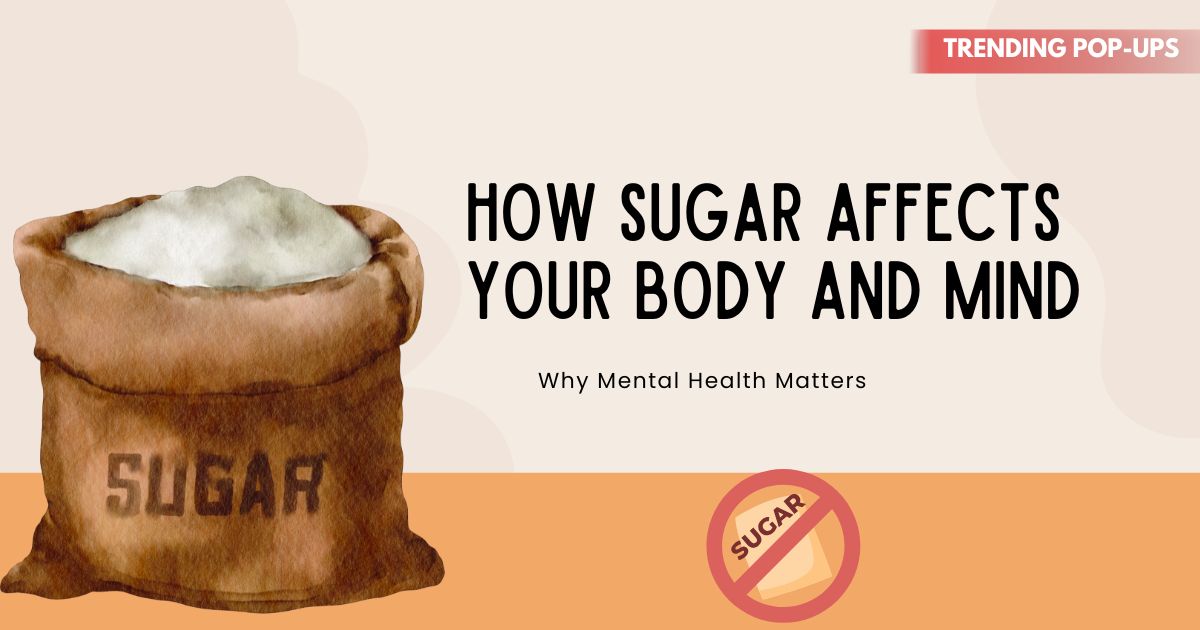Sugar is one of the most widely consumed substances in the modern diet. From soft drinks and desserts to processed foods, sugar seems to be everywhere. While it adds sweetness and flavor, excessive sugar consumption can have significant effects on both your body and mind. Understanding these effects can help you make informed choices for better health and mental well-being.
What is Sugar?
Sugar is a type of carbohydrate that provides energy to the body. The most common form is sucrose, which is found in table sugar. Other forms include glucose, fructose, and lactose, which are present in fruits, milk, and other natural foods. While small amounts of sugar are essential for energy, overconsumption can lead to various health problems.
How Sugar Affects Your Body
1. Weight Gain and Obesity
Consuming too much sugar contributes directly to weight gain. High-sugar foods are calorie-dense but often lack essential nutrients. When sugar intake exceeds your body’s energy needs, it gets stored as fat, increasing the risk of obesity. Studies show that sugary drinks, in particular, are strongly linked to increased abdominal fat.
2. Increased Risk of Diabetes
Excess sugar intake can lead to insulin resistance, a condition where your body’s cells fail to respond effectively to insulin. This can eventually result in type 2 diabetes. Regularly consuming high-sugar foods spikes blood sugar levels, forcing the pancreas to produce more insulin, which over time may cause pancreatic dysfunction.
3. Heart Health Issues
High sugar consumption is associated with cardiovascular diseases. Excess sugar can raise blood pressure, increase triglyceride levels, and promote inflammation, all of which are risk factors for heart disease. Even moderate amounts of added sugar have been linked to an increased risk of heart problems over time.
4. Tooth Decay
One of the most immediate effects of sugar on the body is tooth decay. Sugar feeds harmful bacteria in the mouth, producing acids that erode tooth enamel. Frequent sugar intake, especially in the form of sugary drinks and candies, increases the risk of cavities and gum disease.
5. Liver Damage
Consuming excessive fructose, commonly found in sugary beverages, can lead to non-alcoholic fatty liver disease (NAFLD). The liver metabolizes fructose, and high intake can cause fat accumulation in the liver, leading to inflammation and potential liver damage.
How Sugar Affects Your Mind
1. Mood Swings
Sugar can affect your brain’s chemistry. Rapid spikes in blood sugar can trigger the release of insulin, causing a subsequent blood sugar crash. This fluctuation can lead to irritability, anxiety, and mood swings. Regular consumption of sugary foods may contribute to emotional instability over time.
2. Cognitive Decline
High sugar intake has been linked to impaired memory and learning. Excess sugar can interfere with brain proteins essential for learning, and chronic overconsumption may increase the risk of neurodegenerative diseases like Alzheimer’s.
3. Addiction-Like Effects
Sugar activates the brain’s reward system, releasing dopamine, a neurotransmitter associated with pleasure. This can create a cycle similar to addiction, where you crave more sugar to achieve the same feeling of reward, leading to overeating and unhealthy dietary patterns.
4. Anxiety and Depression
Research suggests a connection between high sugar diets and mental health disorders. Over time, excessive sugar consumption may worsen anxiety, depression, and stress due to inflammation and hormone imbalance caused by frequent blood sugar fluctuations.
Hidden Sources of Sugar
Sugar is not only present in obvious sources like candies and desserts. It is hidden in many processed foods, including:
-
Soft drinks and energy drinks
-
Breakfast cereals
-
Sauces and condiments
-
Packaged snacks
-
Flavored yogurts
Being aware of these hidden sugars is crucial to managing your intake effectively.
Recommended Sugar Intake
The American Heart Association (AHA) recommends limiting added sugar intake to:
-
Men: 36 grams (9 teaspoons) per day
-
Women: 25 grams (6 teaspoons) per day
It’s important to note that these recommendations are for added sugars, not naturally occurring sugars in fruits and vegetables.
Tips to Reduce Sugar Intake
-
Read Labels Carefully – Check for added sugars under names like sucrose, glucose, high fructose corn syrup, and maltose.
-
Choose Whole Foods – Opt for fruits, vegetables, and whole grains instead of processed foods.
-
Drink Water – Replace sugary beverages with water or unsweetened drinks.
-
Cook at Home – Preparing meals at home allows you to control sugar content.
-
Use Natural Sweeteners – Consider honey, stevia, or maple syrup in moderation.
Benefits of Reducing Sugar
Cutting down on sugar can improve both physical and mental health:
-
Better weight management
-
Lower risk of diabetes and heart disease
-
Improved dental health
-
Enhanced mood and cognitive function
-
Reduced inflammation
Even moderate reductions in sugar can have significant positive effects over time.
Conclusion
Sugar, while providing quick energy and sweetness, can have serious consequences for both your body and mind when consumed in excess. From obesity, diabetes, and heart disease to mood swings, cognitive decline, and addiction-like behavior, the impacts are widespread. By understanding how sugar affects your health and making conscious choices to limit intake, you can protect your body, enhance your mental well-being, and enjoy a healthier, more balanced life.
Also Read : Importance of Regular Health Checkups
FAQs
Q1: Is all sugar bad for you?
A: No, natural sugars in fruits, vegetables, and dairy are generally safe and beneficial. The main concern is added sugars in processed foods.
Q2: Can sugar cause diabetes?
A: Excessive sugar can contribute to insulin resistance, increasing the risk of type 2 diabetes, especially when combined with obesity and a sedentary lifestyle.
Q3: How can I tell if a food has too much sugar?
A: Check nutrition labels for added sugars and ingredients like high fructose corn syrup, cane sugar, and dextrose.
Q4: Does sugar affect mental health?
A: Yes, high sugar consumption can lead to mood swings, anxiety, and impaired cognitive function.
Q5: What are some sugar alternatives?
A: Natural sweeteners like stevia, monk fruit, honey, and maple syrup can be used in moderation as healthier alternatives.



